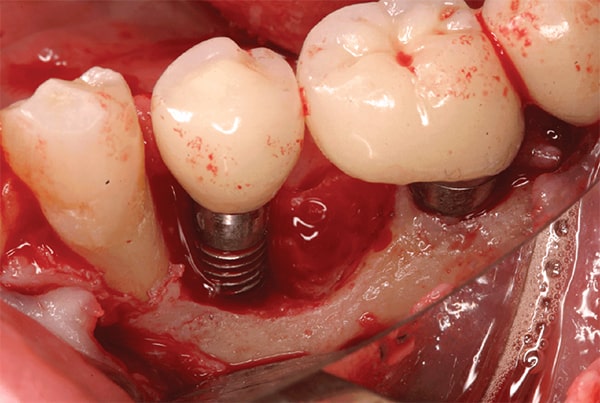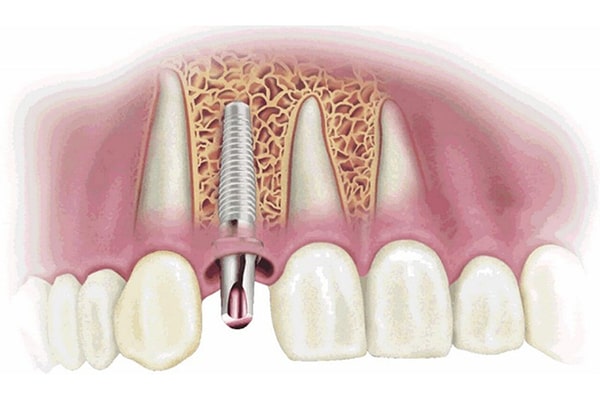Is the Dental Implant process painful?
Dental Implant is a process that not only brings complete teeth but also restores chewing function and confidence in your smile. Many people may have concerns about whether the Dental Implant procedure is painful or not. However, we, the team of dentists at Home Dental, would like to confirm that the Implant process is painless. However, after the anesthetic wears off, you may feel some mild pain. This is a normal response of the body and does not seriously affect the recovery process.
Contents
- 1 Is Dental Implant painful?
- 2 Review: Dental Implant is not painful
- 3 How long will it be uncomfortable after a Dental Implant?
- 4 Is Dental Implant painful? – Affecting factors
- 5 Tips to reduce pain and swelling quickly after dental Implant
- 6
- 7 How long does it take to get a dental implant?
- 8 Is dental implant dangerous?
- 9 Disadvantages of Implant
Is Dental Implant painful?
Regarding the above problem, Dr. Nguyen Anh Ngoc said that during the process of Dental Implant, there will not be any pain or discomfort.
The Dental Implant process is carried out by experienced dentists and is equipped with the most advanced technologies. Before the procedure, the dentist will use a local anesthetic to minimize pain. Thereby, creating a temporary paralysis in the area around the implant site and helps to completely block pain sensation from the nerves. You will not feel pain during the implant procedure.
Besides, thanks to the support of modern machines and advanced technology, the process of implanting teeth takes place quickly and comfortably. The doctor will do it precisely and gently, minimizing discomfort and making sure you don’t experience unpleasant sensations. It is the advanced technology that has helped us to create a safe and painless Implant procedure.
Although the implant process is painless, after the anesthetic wears off, you may feel some mild pain. This is a normal and temporary phenomenon. When placing the implant into the jawbone, it will have an invasive effect on the surrounding bone and soft tissues.
Usually, pain after Dental Implant will be most obvious on the first day and begin to subside after 2-3 days.

Review: Dental Implant is not painful
For a more objective perspective, here’s a look at some patients’ reviews about Dental Implants.
Review of Khanh Chi: “Has anyone here had Implant teeth yet? I don’t know about everyone, but the process of implanting my teeth is very gentle. At first I was scared because I had to drill into the bone to plug the post. However, by the time I finished plugging in 8 posts, I still felt normal. After the anesthetic is gone, it is a little painful though.”
Review of Dong Ngoc: “In the past, when I read many Dental Implant reviews, everyone said it didn’t hurt much, but I didn’t believe it either. However, a few days ago, I just went to Home Dental for a Dental Implant. There was certainly nothing wrong at all. I was injected with anesthetic before the procedure and applied the latest technology. So when it’s done, even if the anesthetic is gone, it’s not too painful. In general, it’s only uncomfortable on the first day.”
Review of Tuan Duong: “If you are worried about whether the Implant will hurt or not, don’t worry. The Implant process is very quick, not painful or too uncomfortable. About 3 days later, it’s a little uncomfortable. But if you take good care of it, it’s okay.”
Thus, with Dental Implant reviews from people who have experienced the service directly, it must have helped you feel more secure when choosing the most modern dental restoration solution at the present time.
How long will it be uncomfortable after a Dental Implant?
Usually, the feeling of pain after the Implant surgery is considered a normal expression and can last for about 2-3 days. This is a natural response of the body after undergoing surgery and placing the Implant into the jawbone. During this time, you may experience mild discomfort and soreness. If you know how to take care of it, after about 7 days, the pain and discomfort will be completely gone.
Of course, the above is only guaranteed when the doctor performs the correct technique, does not make any mistakes and the customer fully complies with the doctor’s instructions for home care.
In some cases, customers will experience severe pain and discomfort for many days due to incorrect technique or improper care by the doctor, leading to wound infection.
Is Dental Implant painful? – Affecting factors
The level of pain after the Implant procedure can be different for each person and that is due to the influence of the factors involved. Below, we will explain these factors in detail so that you have an overview of the implant restoration process.
- Number of teeth implanted: An important factor that affects the level of pain after Dental Implant is the number of teeth that need to be implanted. Naturally, implanting multiple teeth at the same time will create a higher level of pain. In particular, the cases of full jaw restoration can cause pain for many days.
- Position of Implant teeth: The position of the Implant teeth also has a significant influence on the pain level after the Implant procedure. If the missing tooth is located near the nerves, the ability to perceive pain will be higher. A good example is tooth number 6 and number 7. These are the locations that are likely to cause more pain.
- Skill of the dentist: The skill of the dentist plays an important role in reducing pain after the Implant process. A good dentist with skilled technique will perform the Implant process gently, avoiding dangerous complications and minimizing pain.
- Equipment and technology: The skill of the dentist needs to be combined with modern equipment and advanced technology to bring the best results for the process of Dental Implant. The support from the latest equipment and technologies will help you not to suffer too much discomfort.
- Each person’s pain tolerance: Dentists say that each person’s pain tolerance is different and that also greatly affects the level of pain after Dental Implant. To put it simply, for those who have good pain tolerance, the pain after Implant is insignificant. In contrast, for people who have a sensitive body and poor pain tolerance, the pain level will increase.
Tips to reduce pain and swelling quickly after dental Implant
To help the pain after Implant reduce quickly, you just need to use pain relievers from the doctor, eat liquid – soft foods and apply ice.
Take medicine as prescribed
Usually, your dentist will prescribe the right anti-inflammatory and painkiller to help you feel better after the Implant. The use of pain relievers after the Implant process should be done in the correct dosage and under the instructions of the doctor. You should take the medicine according to the time and dose prescribed for the best effect in reducing pain and restoring health.
We recommend that you do not arbitrarily buy other drugs to use after the Implant process. The use of drugs that are not indicated can cause unwanted side effects or negatively affect the restoration process. For safety and effectiveness, follow your doctor’s instructions.
If you still feel pain or do not have the expected relief after taking pain relievers, inform your doctor immediately or visit the clinic directly. Your doctor will examine you and find the best treatment for your condition.

Here are some commonly prescribed pain relievers or anti-inflammatory drugs:
- Paracetamol (Acetaminophen): This is a common pain reliever and is quite safe. It can help relieve pain after the Implant process. However, please follow the correct dosage and directions for use.
- Non-steroidal anti-inflammatory drugs (NSAIDs): This class of drugs includes Ibuprofen, Naproxen, and Diclofenac. They have analgesic and anti-inflammatory effects, helping to reduce swelling after Dental Implant.
- Chlorhexidine gluconate: This is an antibacterial solution used to clean the mouth area. It helps prevent infection and aids in the healing process.
Eat liquid food, soft food
In the early post-surgery period, we recommend that you focus on eating foods that are liquid, soft, digestible, and easy to chew.
Eating liquid and soft foods in the early stages after the Implant has many benefits. First, the consumption of these foods helps reduce pressure on the jaw muscles, helps the wound area not to have to exercise too much and reduces the risk of negative impacts on the Implant integration process.
During the initial period after implantation, the integration process is still not completely stable. Therefore, you should avoid chewing hard, chewy, crunchy foods. Chewing these foods can put pressure on the Implant and adversely affect the healing process. Instead, focus on foods that are easy to chew and digest to ensure comfort and support recovery.
Besides eating liquid and soft foods, you need to add more green vegetables and fruits to your daily diet. Vegetables and fruits are important sources of vitamins and antioxidants, which promote health and aid in the recovery process. Make sure you have a varied and balanced diet, including fresh green vegetables and high-dining fruits

Apply ice to the painful area
Applying ice is a natural and inexpensive method for extremely effective, fast pain relief. When applying cold ice, the low temperature from the ice slows down blood circulation to the affected area, and creates a temporary numbing effect on the nerve, helping to reduce pain and discomfort significantly.
For best performance and safety, follow these steps:
- Prepare a clean towel and previously cooled ice. You can use an ice pack or ice cubes wrapped in a towel.
- Wrap ice in a towel to avoid direct skin contact. This helps to avoid excessive cold impact and prevents the risk of frostbite.
- Apply ice to the sore cheek area for 10-15 minutes. Be sure to apply gentle pressure and move the compress around the painful area.
- After applying ice for the amount of time mentioned above, rest for the same amount of time before continuing with the next application. Besides, you should only apply ice for the first 1-2 days, then switch to warm compresses.
How long does it take to get a dental implant?
Dental Implant is a complicated process and the time taken will depend on the condition of each person’s teeth. Usually, the installation of the implant only takes about 20-30 minutes. However, the completion process will take 3 to 6 months. During this time, a process known as ossification occurs, in which the bone surrounding the implant post actively builds connective tissue to strengthen the foundation.
However, with the use of high-quality Implants, the implementation time can be significantly shortened. This is especially useful for those who want to complete the implant process in less time.
Through advanced technology, the Implant is capable of stimulating the process of bone fusion, reducing the waiting time from 3 to 6 months to only 6 weeks. That can bring great benefits to the patients, helping them quickly get back the perfect smile and confidence in their daily lives.
Is dental implant dangerous?
According to leading dental experts, Dental Implants are a safe and effective method for missing teeth if performed by a trusted, experienced dentist, as well as supported by modern machinery and technology.
The process of implanting teeth requires a precise and careful process to ensure the best results, avoiding the risk of harm to health. It is important to find a reputable dental facility that has a team of experienced dentists and uses cutting-edge technology in the Dental Implant process.
After successful Implant placement, we need to strictly follow care and hygiene measures to protect the Implant teeth and maintain oral health. Proper brushing, flossing and regular dental visits will play an important role in maintaining the stability and prolonging the life of the Implant teeth.
So, if you are considering Dental Implants, make sure to choose a reputable dental facility and strictly follow after-care measures. It will ensure that you have a safe and effective experience, and moreover, Dental Implants will provide a confident smile and good health in the future.

Disadvantages of Implant
Dental Implant is considered the most advanced cosmetic dental restoration method at the present time, with many outstanding advantages.
However, like other methods, Dental Implants also have disadvantages that you need to learn carefully.
First – Long execution time: As you can see, to complete a restoration of an Implant tooth will take us several months, while a removable denture or porcelain bridge only takes 2 – 3 days.
Second – High cost: Compared with other methods, the cost of Dental Implants is always more expensive.
Third – Not suitable for everyone: Although all cases of tooth loss can be restored, Implant is not a suitable method for everyone. More precisely, in order to plant Implant, the customer must have a stable health.
Fourth – Requires a highly skilled dentist: This is a relatively complex dental technique, so it is imperative that the doctor has good expertise, extensive experience, and a thorough understanding of each operation to ensure the end result.
Hopefully, the above information has helped you answer the question “Does Implant hurt?” exactly. In general, the pain when implanting teeth only appears after the anesthetic wears off and does not affect our lives too much. Simply, we just need to know how to take care of the above situation.

